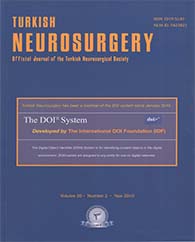2,3,4,5GATA Haydarpaşa Training Hospital, Neurosurgery Department, Uskudar,Istanbul, Turkey
6GATA Haydarpaşa Training Hospital, Pathology Department, Uskudar, Istanbul, Turkey
7,8Celal Bayar University, Faculty of Medicine, Neurosurgery Department, Manisa, Turkey
9Celal Bayar University, Faculty of Medicine, Histology and Embryology Department, Manisa, Turkey DOI : 10.5137/1019-5149.JTN.2659-09 AIM: The aim of this study is to demonstrate the effect of meloxicam in early stage chick embryos on neural tube development.
MATERIAL and METHODS: One hundred specific pathogen-free (SPF) chicken eggs were used to investigate the neurulation. SPF eggs were invastigated in four groups (n:25). All of the groups were incubated at 37.2 ± 0.1 °C and 60 ± 5 % relative humidity for 30 hours, and an embryological development in the ninth stage as classified by Hamburger and Hamilton was obtained. In the end of the 30th hour, group A(control group) was administered 0.1 ml of saline (0.9% NaCl) in ovo and the other groups were administered meloxicam in increasing doses. At the end of 72 hours, all of the embryos were extracted from eggs and they underwent pathological examination with hematoxylin eosine and immunohistopathological examinations with CD138 and tubulin beta II.
RESULTS: While the groups Aand B showed no neural tube defects, totally eight defective embryos were detected in the groups C and D (three in group C and five in group D.
CONCLUSION: Our results suggested that meloxicam, a nonselective COX inhibitor, caused neural tube closure defects when injected at supratherapeutic doses. However, further studies with larger numbers of subjects are needed for its use in lower doses.
Keywords : Neural tube defect, Early period, Chick embryo, Neurulation, Meloxicam




